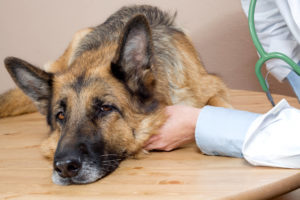

The disease is called Leptospirosis, and it is caused by Leptospira bacteria. The bacteria are spiral or corkscrew-shaped and infection can occur through the skin or mucous membranes (including gums and eyes). The bacteria can survive for months in warm moist environments such as stagnant waters, ponds, and areas prone to flooding. Rodents can spread the disease through their urine and continue to contaminate the environment. It is thought the disease has appeared in Sydney through increased numbers of rats emerging due to constructions in the city. The University of Sydney Veterinary Faculty is currently researching which strain(s) is/are involved in this outbreak and are trying to find out the source of the infection.
If the bacteria are in the environment, prevention can be quite difficult, but try to avoid contact with rodents, drinking from puddles, and swimming in stagnant water holes and ponds.
Risk for Dogs
Dogs in our area are not routinely vaccinated for Leptospirosis, as we don’t commonly see this disease, but a vaccine is available. Considering this is such a lethal disease for our dogs, with a real risk of the bacteria being spread to people as well, at present, we do recommend vaccinating if your dog is at all at risk of contracting the disease. Two vaccinations, given 2-4 weeks apart are needed to protect our dogs, as they have not received routine prior vaccinations for this disease.
Symptoms of the disease can include:
• Nonspecific clinical signs like lethargy, not eating, vomiting and diarrhoea
• Fever, shivering, dehydration
• Drinking and urinating a lot, blood in the urine, in some cases no urine production at all
• Bruising in skin
• Pale or yellow gums
• Sore muscles, stiffness, weakness
Dogs can go downhill very rapidly indeed!
NSW Health warns that leptospirosis in people can frequently be confused for the flu in the early stages.
Risk for Humans
People should make sure to pay extra attention to hygiene such as hand washing, avoiding having food scraps around that attract rodents as the bacteria can cause serious disease in people as well. If you suspect your dog has come down with this disease, be extra careful to wear gloves, protect eyes and mouth and seek veterinary attention as soon as possible.
In humans, symptoms include fever, headache, vomiting and red eyes. In severe cases, it can lead to kidney failure, liver failure and jaundice, haemorrhages and meningitis (inflammation of the brain).
If you have any concerns, questions, or would like to have your dog vaccinated against Leptospirosis, please don’t hesitate to contact our friendly team at Cronulla Veterinary Clinic (9527 2604).
